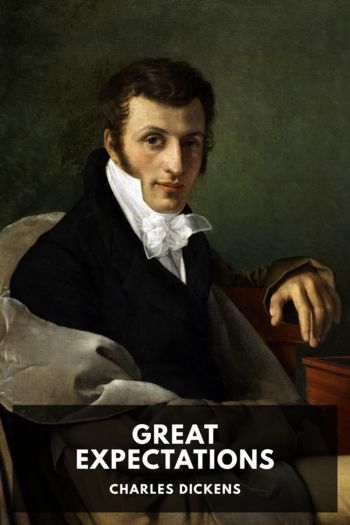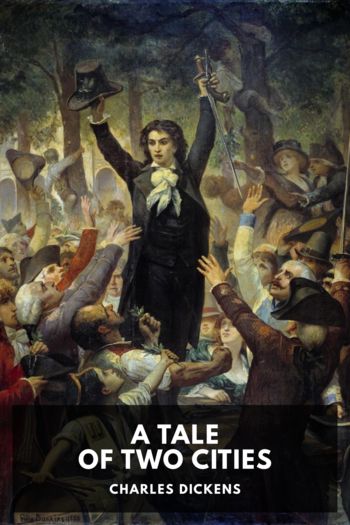Great Expectations by Charles Dickens (e textbook reader .txt) 📕

- Author: Charles Dickens
Book online «Great Expectations by Charles Dickens (e textbook reader .txt) 📕». Author Charles Dickens
I have never seen two men look more oddly at one another than Mr. Jaggers and Wemmick did after this apostrophe. At first, a misgiving crossed me that Wemmick would be instantly dismissed from his employment; but it melted as I saw Mr. Jaggers relax into something like a smile, and Wemmick become bolder.
“What’s all this?” said Mr. Jaggers. “You with an old father, and you with pleasant and playful ways?”
“Well!” returned Wemmick. “If I don’t bring ’em here, what does it matter?”
“Pip,” said Mr. Jaggers, laying his hand upon my arm, and smiling openly, “this man must be the most cunning impostor in all London.”
“Not a bit of it,” returned Wemmick, growing bolder and bolder. “I think you’re another.”
Again they exchanged their former odd looks, each apparently still distrustful that the other was taking him in.
“You with a pleasant home?” said Mr. Jaggers.
“Since it don’t interfere with business,” returned Wemmick, “let it be so. Now, I look at you, sir, I shouldn’t wonder if you might be planning and contriving to have a pleasant home of your own one of these days, when you’re tired of all this work.”
Mr. Jaggers nodded his head retrospectively two or three times, and actually drew a sigh. “Pip,” said he, “we won’t talk about ‘poor dreams;’ you know more about such things than I, having much fresher experience of that kind. But now about this other matter. I’ll put a case to you. Mind! I admit nothing.”
He waited for me to declare that I quite understood that he expressly said that he admitted nothing.
“Now, Pip,” said Mr. Jaggers, “put this case. Put the case that a woman, under such circumstances as you have mentioned, held her child concealed, and was obliged to communicate the fact to her legal adviser, on his representing to her that he must know, with an eye to the latitude of his defence, how the fact stood about that child. Put the case that, at the same time he held a trust to find a child for an eccentric rich lady to adopt and bring up.”
“I follow you, sir.”
“Put the case that he lived in an atmosphere of evil, and that all he saw of children was their being generated in great numbers for certain destruction. Put the case that he often saw children solemnly tried at a criminal bar, where they were held up to be seen; put the case that he habitually knew of their being imprisoned, whipped, transported, neglected, cast out, qualified in all ways for the hangman, and growing up to be hanged. Put the case that pretty nigh all the children he saw in his daily business life he had reason to look upon as so much spawn, to develop into the fish that were to come to his net—to be prosecuted, defended, forsworn, made orphans, bedevilled somehow.”
“I follow you, sir.”
“Put the case, Pip, that here was one pretty little child out of the heap who could be saved; whom the father believed dead, and dared make no stir about; as to whom, over the mother, the legal adviser had this power: ‘I know what you did, and how you did it. You came so-and-so, you did such and such things to divert suspicion. I have tracked you through it all, and I tell it you all. Part with the child, unless it should be necessary to produce it to clear you, and then it shall be produced. Give the child into my hands, and I will do my best to bring you off. If you are saved, your child is saved too; if you are lost, your child is still saved.’ Put the case that this was done, and that the woman was cleared.”
“I understand you perfectly.”
“But that I make no admissions?”
“That you make no admissions.” And Wemmick repeated, “No admissions.”
“Put the case, Pip, that passion and the terror of death had a little shaken the woman’s intellects, and that when she was set at liberty, she was scared out of the ways of the world, and went to him to be sheltered. Put the case that he took her in, and that he kept down the old, wild, violent nature whenever he saw an inkling of its breaking out, by asserting his power over her in the old way. Do you comprehend the imaginary case?”
“Quite.”
“Put the case that the child grew up, and was married for money. That the mother was still living. That the father was still living. That the mother and father, unknown to one another, were dwelling within so many miles, furlongs, yards if you like, of one another. That the secret was still a secret, except that you had got wind of it. Put that last case to yourself very carefully.”
“I do.”
“I ask Wemmick to put it to himself very carefully.”
And Wemmick said, “I do.”
“For whose sake would you reveal the secret? For the father’s? I think he would not be much the better for the mother. For the mother’s? I think if she had done such a deed she would be safer where she was. For the daughter’s? I think it would hardly serve her to establish her parentage for the information of her husband, and to drag her back to disgrace, after an escape of twenty years, pretty secure to last for life. But add the case that you had loved her, Pip, and had made her the subject of those ‘poor dreams’ which have, at one time or another, been in the heads of more men than you think





Comments (0)